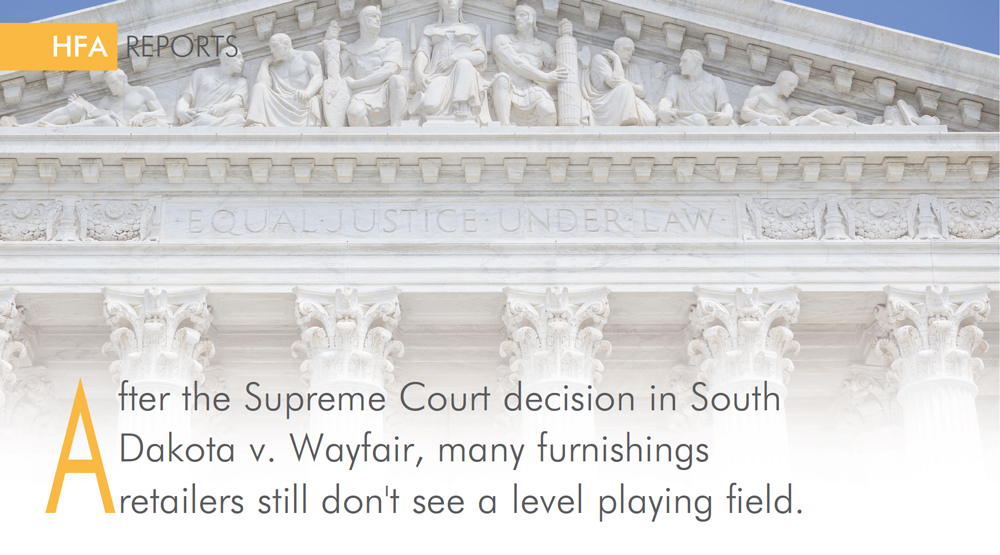
Dozens of states have run with last year’s South Dakota v. Wayfair decision – in all different directions.
The U.S. Supreme Court’s 5-4 ruling in June 2018 opened the door for states to require that remote online vendors collect sales tax on purchases made by residents. That outcome was cheered by the Home Furnishings Association and many of its members because it helped level the playing field for brick-and-mortar retailers.
Some States are More Level Than Others
Texas began enforcing its online sales-tax collection requirement on October 1, but only for out-of-state retailers that exceed $500,000 in sales to Texas residents in a calendar year. That is equal to the highest threshold in the country, along with California, New York and Tennessee. It infuriates Chris Pfeifer, owner of HFA member Homestead House in Conroe, Texas.
“I don’t get a threshold,” he says. “I’ve got to collect tax on every sale.”
The sales-tax rate in Conroe is 8.25 percent. That’s a price break that online competitors can give purchasers if no sales tax is collected. Pfeifer also noted that Conroe’s City Council in August was set to raise the local property tax, which online competitors don’t pay, either. He feels the disadvantage every time a customer comes into his store to select furniture, only to order it online from someone else.
Pfeifer, a member of HFA’s Government Relations Action Team, has lobbied Texas legislators to knock down the $500,000 threshold – to no avail, so far. But he won’t give up
Critics of the Kansas requirement
think that, without a reasonable degree of protection,
online vendors with
modest sales might be able to mount
a successful legal challenge. |
In other states, leaders have responded positively to similar complaints. Ohio and Massachusetts recently reduced the threshold from $500,000 to $100,000. Connecticut's dropped from $250,000 to $100,000, and a similar change will take effect on January 1st in Georgia. Arizona’s $200,000 threshold will slide to $150,000 in 2020 and to $100,000 in 2021.
Phil Vinson, store manager for HFA member Kitchen Tables and More in Columbus, Ohio, welcomed the lower threshold in his state.
“It evens the playing field when we’re competing with online retailers who are selling into our state,” said Vinson, who works closely with his father, Gary, in the family-owned business. The difference comes to hundreds of dollars on a large order. If more online sellers charge the same tax, “That gives us the chance to negotiate, it puts the ball back in our court a little bit.”
His business sells to customers in other states, too, but doesn’t approach any thresholds, Vinson said.
Then there’s Kansas, which has made the boldest move so far. Although Gov. Laura Kelly vetoed a tax bill that included a remote, online seller sales-tax requirement, and the legislature adjourned for the year without an override vote, Treasurer Mark Burghart acted. Citing authority granted by the South Dakota v. Wayfair ruling, he implemented a sales-tax collection mandate with no threshold.
The move was controversial and perhaps legally perilous. In writing for the court last year, then-Justice Anthony Kennedy noted that South Dakota’s tax requirement would not place an undue burden on small merchants because the state’s $100,000 exemption provided “a reasonable degree of protection.” Critics of the Kansas requirement think that, without “a reasonable degree of protection,” online vendors with modest sales might be able to mount a successful legal challenge.
But Pfeifer and other furniture retailers who collect sales tax on every purchase would ask where is their reasonable protection? There is no clear or consistent answer more than a year after South Dakota v. Wayfair.
For information about HFA’s government relations work, contact Doug Clark at dclark@myhfa.org or 916-757-1167.
A feature about Home Furnishings Association's retail members, legislation affecting the furniture industry and other retail news from HFA.